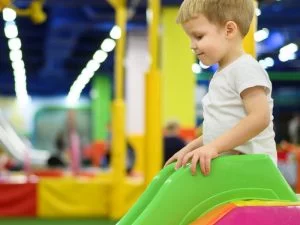
Many parents in Singapore today are faced with the tough challenge of raising intelligent, creative, and social thinkers. The next generation of Singaporean pre-schoolers are expected to be well-prepared to handle both the academic rigors of school and establish good social interaction skills with their peers.
Many of us remember our childhood fondly. We learned what we could in class, and lessons were immensely enjoyed. Time after school as a pre-schooler was sacred. This time was usually spent in bliss, either fighting imaginary monsters on the sofa with toys, or jumping around like crazy monkeys. In those days, parents openly encouraged this sort of play, as there was less stress regarding academics.
Our young children nowadays grow up in a different context, and many of them spend hours in academic preparation classes or other forms of enrichment. Even so, it is important for parents to dedicate some time to playing and having fun – studies have shown that engaging in play does bring about benefits.
Researchers in cognitive development have discovered that play has an entirely positive effect on the mental development of children. The best part? Play actually helps children learn. According to University of Berkeley’s Professor Alison Gopnik, play (especially imaginative play) helps children learn and think better:
“The idea is that children at play are like pint-sized scientists testing theories. They imagine ways the world could work and predict the pattern of data that would follow if their theories were true, and then compare that pattern with the pattern they actually see.”
Additionally, play encourages social interaction and trains communication skills. As children sometimes play in groups, they may learn how to make friends in the process. It serves as a platform for them to test out what they have learnt in classes, be it wittingly or unwittingly. Also, it reduces the stress children may be experiencing in class – it is a natural way for them to unwind after a long, tiring day.
That being said, while play is of course fun, it need not be aimless fun all the time. In hindsight, the endless hours spent cultivating our imaginary worlds were probably guided by the hands of our watchful parents and pre-school teachers, who intended for us to learn more about the things and people around us.
As a parent, what would be a few things you could do to make your child’s play sessions more fruitful then? Here are some tips.
1. Play an active role in your child’s fantasies
A great tip for facilitating learning when your child is at play would be to try your best to take part in whatever scenario is happening in your child’s head. Much like an actor in a movie, your child has already placed you in his imaginary ‘cast’, and you should aim to act out the role given to you. It allows you to integrate yourself into your child’s world, and places you in a great position to secretly slip a few lessons in as you interact with him. Whether you are his sidekick or antagonist, slipping facts into your dialogue as part of your character will not be difficult. After all, it is much easier for your child to absorb the fact that his metal armour gets hot extremely fast from the dragon’s fire, rather than to tell him straight on that metal is a good conductor of heat.
2. Ask questions to make your children think
A child’s imagination is made up many different layers, and there are probably plenty of misconceptions that occur when a child is creating his wondrous imaginary world. While it is never acceptable to completely ruin any child’s fantasy by asking too many questions grounded in reality, there will be the occasional opportunity for you to poke fun at your child with innocent queries. It makes your child pause to think, and not only does this improve his reasoning skills, slipping some answers once he has thought through it enough allows him to walk away with a new little titbit of information in the process.
3. Bring them outdoors once in a while
A change of scenery on occasion is never a bad thing, and bringing your child outdoors is a perfect way for your child to have more fun and learn at the same time. Places such as parks and gardens help to cultivate sensory learning as your child learns how to integrate nature into his fantasies. As he immerses himself into the environment, your child will absorb information about the surroundings around him. As a parent you can make suggestions to him and prompt your child to explore nature more. It may be as simple as an exercise in tactile learning by feeling the bark of trees and leaves, or something more complex such as listening for different types of birdsong in the trees. Drawing these lessons back to his imaginary world helps him to better build his world and add more diverse characteristics to it.
4. Integrate games into play sessions when possible
The introduction of games into your periods of play with your child is a good chance to build character. Card games, board games, even wacky little games that you may have thought up on the spot will help your child immensely. In the process of these games, your child will pick up certain valuable traits, such as how to take turns and how to lose graciously, strengthening character and helping your child integrate socially in the future. Additionally, in the process of playing these games, they will also learn how to win via the use of certain thinking skills that will certainly aid them in the academic field.
5. Never underestimate the power of toys
To quote Garry L. Landreth, ‘toys are children’s words and play is their language.’
It is always a great idea to keep toys lying around to facilitate play, as toys are powerful tools that you can use to help children learn. A physical representation of whatever they might be seeing in their psyche, children who play with toys are able to better visualise their imaginary worlds. The importance of imaginative play in your child’s learning journey, and the huge role toys have in facilitating this will mean that parents should always keep a stock of things like toy soldiers or figurines at hand. Foregoing digital devices for physical toys on occasion is also a good way to encourage imaginative play in your children.
Parents looking for a place for their children to learn while having fun need not look far. Mulberry Learning Centre, a network of premium child care and infant care centres in Singapore and Australia, has a unique pedagogy that integrates play into the child’s learning journey. It combines the best of renowned approaches like Reggio Emilia, Multiple Intelligences and Habits of Mind, and it is the first preschool network in the world to be certified by the USA.
Click here to register for School Tour today.
In collaboration and reference to: http://joyofandroid.com/best-apps-keeping-kids-safe-android/




